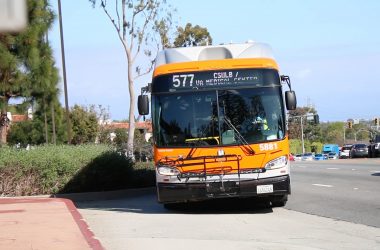The Department of Science Education at Cal State Long Beach received a $945,222 grant to continue funding its science program with a local elementary school.
The California Postsecondary Education Commission (CPEC), with funds from the No Child Left Behind Act, awarded the grant to help improve science teaching in kindergarten through fourth grade at Bell Gardens Elementary School in the Montebello School District.
The grant will provide professional development to 50 teachers who will engage in a series of training courses and work with facilitators to learn new science content and practice effective science teaching exercises. The elementary teachers will also participate in team teaching projects with their colleagues, as well as attend workshops over the summer.
This new funding comes as a sister grant to the $950,694 that CPEC awarded to CSULB’s Department of Science Education last year. The grant funded 42 teachers for a series of summer institutes and small group lesson study teams on the “K-2 Teaching Learning Collaborative” project.
“With all of the recent budget cuts, this grant comes in at a great time,” said Gudiel Crosthwaite, Bell Gardens Elementary School principal.
Bell Gardens Elementary School has 1,000 students, many of whom live at or below poverty levels and learn English as a second language. Test scores have led to increased focus on English language development (ELD), language arts and math, according to William Straits and Susan Gomez-Zwiep, assistant professors of science education in the College of Natural Sciences and Mathematics. Both Gomez-Zwiep and Straits have aimed at combining ELD with science through the initiation of the Bell Gardens Science Project, so that students can learn both at the same time.
“Being able to apply ELD to the science program makes this an even better opportunity considering 81 percent of our students are English learners,” Crosthwaite said.
While the community is tight knit and generally supportive, many of the families tend to have low-education and are not always comfortable going out into the world and trying things outside of their norm, a custom that undoubtedly passes onto the children, according to Gomez-Zwiep.
“These kids traditionally haven’t gotten science,” Gomez-Zwiep said in a prepared statement. “The same thing is happening at middle school. You are talking about kids who aren’t really getting science instruction sometimes until eighth grade.”
The Bell Gardens Science Project makes it a priority to get the students in contact with what real science looks like, since there is not much natural setting in the busy and noisy city atmosphere. One of the program’s partners is the Discovery Science Center in Santa Ana, which helps coordinate educational field trips and learning experiences with the teachers.
“The teachers are a great group,” Crosthwaite said. “They are excited about what’s to come, and walked away really happy at their first meeting a few weeks ago.”
“CSU Long Beach and its partner schools should be proud of the quality of their proposal and its potential for improving teaching and learning in the Long Beach area,” said CPEC Chair Olivia Singh.
CPEC also offered five other partnership grants for the academic year, including funding a Science and Academic Literacy project between CSU Chico and Gridley Unified School District, an Algebraic Learning collaboration between CSU San Bernardino and Ontario-Montclair School District and a Math and Science Success Project for UC Irvine and Compton Unified School District.
In the past two decades, CPEC has awarded more than $93 million in federal grants to colleges and universities working with K-12 schools in California.



